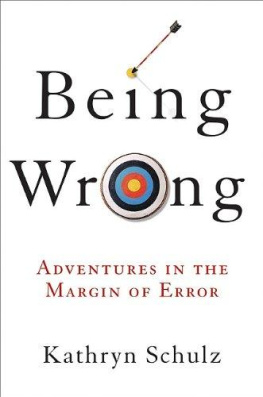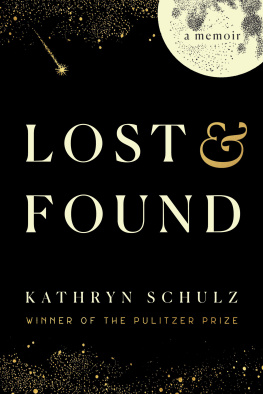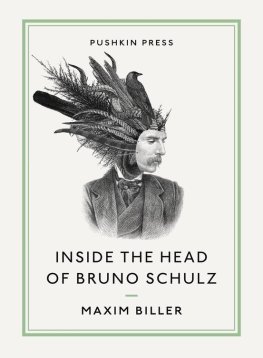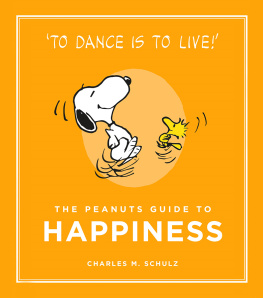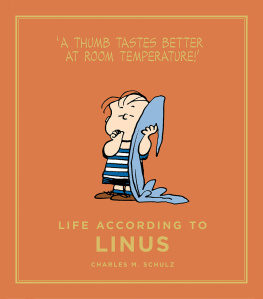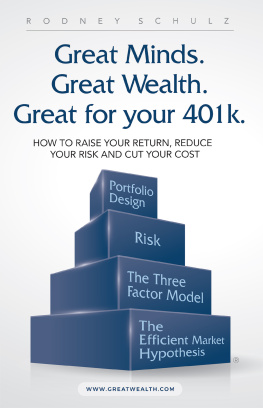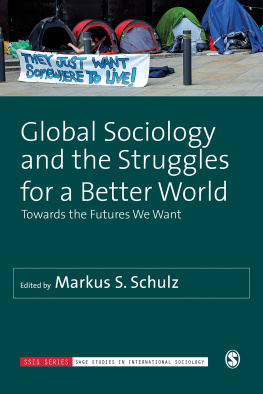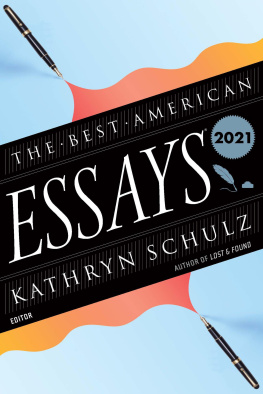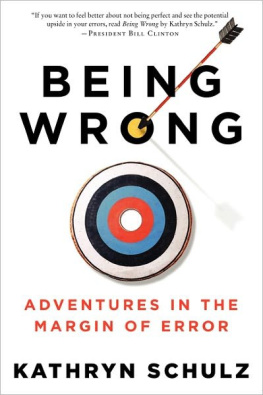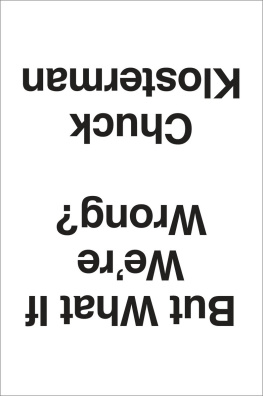Kathryn Schulz - Being Wrong: Adventures in the Margin of Error
Here you can read online Kathryn Schulz - Being Wrong: Adventures in the Margin of Error full text of the book (entire story) in english for free. Download pdf and epub, get meaning, cover and reviews about this ebook. year: 2010, publisher: HarperCollins, genre: Religion. Description of the work, (preface) as well as reviews are available. Best literature library LitArk.com created for fans of good reading and offers a wide selection of genres:
Romance novel
Science fiction
Adventure
Detective
Science
History
Home and family
Prose
Art
Politics
Computer
Non-fiction
Religion
Business
Children
Humor
Choose a favorite category and find really read worthwhile books. Enjoy immersion in the world of imagination, feel the emotions of the characters or learn something new for yourself, make an fascinating discovery.
- Book:Being Wrong: Adventures in the Margin of Error
- Author:
- Publisher:HarperCollins
- Genre:
- Year:2010
- Rating:4 / 5
- Favourites:Add to favourites
- Your mark:
- 80
- 1
- 2
- 3
- 4
- 5
Being Wrong: Adventures in the Margin of Error: summary, description and annotation
We offer to read an annotation, description, summary or preface (depends on what the author of the book "Being Wrong: Adventures in the Margin of Error" wrote himself). If you haven't found the necessary information about the book — write in the comments, we will try to find it.
Being Wrong: Adventures in the Margin of Error — read online for free the complete book (whole text) full work
Below is the text of the book, divided by pages. System saving the place of the last page read, allows you to conveniently read the book "Being Wrong: Adventures in the Margin of Error" online for free, without having to search again every time where you left off. Put a bookmark, and you can go to the page where you finished reading at any time.
Font size:
Interval:
Bookmark:
For my family,
given and chosen
And for Michael and Amanda,
at whose expense
I wrote about what I knew
Perhaps the history of the errors of mankind, all things considered, is more valuable and interesting than that of their discoveries. Truth is uniform and narrow; it constantly exists, and does not seem to require so much an active energy, as a passive aptitude of soul in order to encounter it. But error is endlessly diversified; it has no reality, but is the pure and simple creation of the mind that invents it. In this field, the soul has room enough to expand herself, to display all her boundless faculties, and all her beautiful and interesting extravagancies and absurdities.
Benjamin Franklin, Report of Dr. Benjamin Franklin, and Other Commissioners, Charged by the King of France, with the Examination of the Animal Magnetism, as Now Practiced in Paris (1784)
M AN : You said pound cake.
W OMAN : I didnt say pound cake, I said crumb cake.
M AN : You said pound cake.
W OMAN : Dont tell me what I said.
M AN : You said pound cake.
W OMAN : I said crumb cake.
M AN : I actually saw the crumb cake but I didnt get it because you said pound cake.
W OMAN : I said crumb cake.
M AN : Well, I heard pound cake.
W OMAN : Then you obviously werent listening. Crumb cake doesnt even sound like pound cake.
M AN : Well, maybe you accidentally said pound cake. Woman: I said crumb cake.
overheard in Grand Central Station, November 13, 2008
It infuriates me to be wrong when I know Im right.
M OLIRE
Why is it so fun to be right? As pleasures go, it is, after all, a second-order one at best. Unlike many of lifes other delightschocolate, surfing, kissingit does not enjoy any mainline access to our biochemistry: to our appetites, our adrenal glands, our limbic systems, our swoony hearts. And yet, the thrill of being right is undeniable, universal, and (perhaps most oddly) almost entirely undiscriminating. We cant enjoy kissing just anyone, but we can relish being right about almost anything. The stakes dont seem to matter much; its more important to bet on the right foreign policy than the right racehorse, but we are perfectly capable of gloating over either one. Nor does subject matter; we can be equally pleased about correctly identifing an orange-crowned warbler or the sexual orientation of our coworker. Stranger still, we can enjoy being right even about disagreeable things: the downturn in the stock market, say, or the demise of a friends relationship, or the fact that, at our spouses insistence, we just spent fifteen minutes schlepping our suitcase in exactly the opposite direction from our hotel.
Like most pleasurable experiences, rightness is not ours to enjoy all the time. Sometimes we are the one who loses the bet (or the hotel). And sometimes, too, we are plagued by doubt about the correct answer or course of actionan anxiety that, itself, reflects the urgency of our desire to be right. Still, on the whole, our indiscriminate enjoyment of being right is matched by an almost equally indiscriminate feeling that we are right. Occasionally, this feeling spills into the foreground, as when we argue or evangelize, make predictions or place bets. Most often, though, it is just psychological backdrop. A whole lot of us go through life assuming that we are basically right, basically all the time, about basically everything: about our political and intellectual convictions, our religious and moral beliefs, our assessment of other people, our memories, our grasp of facts. As absurd as it sounds when we stop to think about it, our steady state seems to be one of unconsciously assuming that we are very close to omniscient.
To be fair, this serene faith in our own rightness is often warranted. Most of us navigate day-to-day life fairly well, after all, which suggests that we are routinely right about a great many things. And sometimes we are not just routinely right but spectacularly right: right about the existence of atoms (postulated by ancient thinkers thousands of years before the emergence of modern chemistry); right about the healing properties of aspirin (recognized since at least 3000 BC); right to track down that woman who smiled at you in the caf (now your wife of twenty years). Taken together, these moments of rightness represent both the high-water marks of human endeavor and the source of countless small joys. They affirm our sense of being smart, competent, trustworthy, and in tune with our environment. More important, they keep us alive. Individually and collectively, our very existence depends on our ability to reach accurate conclusions about the world around us. In short, the experience of being right is imperative for our survival, gratifying for our ego, and, overall, one of lifes cheapest and keenest satisfactions.
This book is about the opposite of all that. It is about being wrong: about how we as a culture think about error, and how we as individuals cope when our convictions collapse out from under us. If we relish being right and regard it as our natural state, you can imagine how we feel about being wrong. For one thing, we tend to view it as rare and bizarrean inexplicable aberration in the normal order of things. For another, it leaves us feeling idiotic and ashamed. Like the term paper returned to us covered in red ink, being wrong makes us cringe and slouch down in our seat; it makes our heart sink and our dander rise. At best we regard it as a nuisance, at worst a nightmare, but in either caseand quite unlike the gleeful little rush of being rightwe experience our errors as deflating and embarrassing.
And thats just for starters. In our collective imagination, error is associated not just with shame and stupidity but also with ignorance, indolence, psychopathology, and moral degeneracy. This set of associations was nicely summed up by the Italian cognitive scientist Massimo Piattelli-Palmarini, who noted that we err because of (among other things) inattention, distraction, lack of interest, poor preparation, genuine stupidity, timidity, braggadocio, emotional imbalance,ideological, racial, social or chauvinistic prejudices, as well as aggressive or prevaricatory instincts. In this rather despairing viewand it is the common oneour errors are evidence of our gravest social, intellectual, and moral failings.
Of all the things we are wrong about, this idea of error might well top the list. It is our meta-mistake: we are wrong about what it means to be wrong. Far from being a sign of intellectual inferiority, the capacity to err is crucial to human cognition. Far from being a moral flaw, it is inextricable from some of our most humane and honorable qualities: empathy, optimism, imagination, conviction, and courage. And far from being a mark of indifference or intolerance, wrongness is a vital part of how we learn and change. Thanks to error, we can revise our understanding of ourselves and amend our ideas about the world.
Given this centrality to our intellectual and emotional development, error shouldnt be an embarrassment, and cannot be an aberration. On the contrary. As Benjamin Franklin observed in the quote that heads this book, wrongness is a window into normal human natureinto our imaginative minds, our boundless faculties, our extravagant souls. This book is staked on the soundness of that observation: that however disorienting, difficult, or humbling our mistakes might be, it is ultimately wrongness, not rightness, that can teach us who we are.
This idea is not new. Paradoxically, we live in a culture that simultaneously despises error and insists that it is central to our lives. We acknowledge that centrality in the very way we talk about ourselveswhich is why, when we make mistakes, we shrug and say that we are human. As bats are batty and slugs are sluggish, our own species is synonymous with screwing up. This built-in propensity to err is also recognized within virtually every religious, philosophical, and scientific account of personhood. Nor are errors, in these accounts, just surface features or passing oddities, like hiccups or fingernails or dj vu. Twelve hundred years before Ren Descartes penned his famous I think, therefore I am, the philosopher and theologian (and eventual saint) Augustine wrote fallor ergo sum : I err, therefore I am. In this formulation, the capacity to get things wrong is not only part of being alive, but in some sense proof of it. For Augustine as for Franklin, being wrong is not just what we do. In some deep sense, it is who we are.
Font size:
Interval:
Bookmark:
Similar books «Being Wrong: Adventures in the Margin of Error»
Look at similar books to Being Wrong: Adventures in the Margin of Error. We have selected literature similar in name and meaning in the hope of providing readers with more options to find new, interesting, not yet read works.
Discussion, reviews of the book Being Wrong: Adventures in the Margin of Error and just readers' own opinions. Leave your comments, write what you think about the work, its meaning or the main characters. Specify what exactly you liked and what you didn't like, and why you think so.

